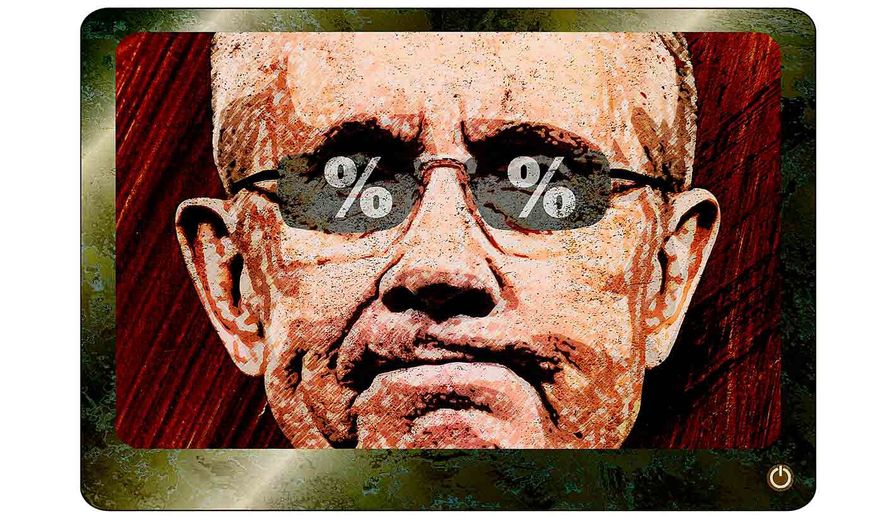OPINION:
As millions of Americans shop online this Cyber Monday, Sen. Harry Reid is plotting to pass Internet sales tax legislation soon that would increase online shoppers’ tax burden and land a decisive blow against thousands of mom and pop online retailers.
Among them are Colleen and Jeff Rast. Thirteen years ago, their family moved from Philadelphia to the heart of the Rockies after Jeff got a job offer in Kalispell, Mont., near Glacier National Park, the “Crown Jewel of the Continent.”
After difficulty finding a job that didn’t require extensive travel away from her family, Colleen started buying and selling items on eBay. What had started as a hobby took on great importance to the family when Jeff’s company became a casualty of the recession.
“This was no longer extra income,” Colleen said. “It was income we needed.”
Today, the couple operates their business out of a 6,000 square-foot warehouse and has hired four employees from their community.
Colleen and Jeff’s success story is quintessentially American and made possible by the Internet — one of the last laboratories of economic freedom. Because the Internet is relatively unhindered by taxes and regulations, stories like theirs are not uncommon.
Yet Mr. Reid has vowed to do “whatever it takes” to pass the so-called Marketplace Fairness Act, legislation that could shut down thousands of small businesses like Colleen and Jeff’s.
Proponents say it would “level the playing field” between online retailers and brick-and-mortar stores by requiring online retailers to collect sales tax for the buyer’s state and local jurisdictions.
They contend that online retailers are at an advantage because of “showrooming,” wherein consumers visit a store to view items, then return home and make their purchase online in order to avoid sales tax.
However, a study of 10,000 shoppers found the opposite: Consumers are far more likely to research products online before purchasing them at a local shop.
It turns out that the Internet is a boon for your neighborhood store.
Defenders also say that it’s not a tax increase, but their proposed legislation would increase the average online shopper’s tax bill by $360 a year, taking more than $24 billion out of their pockets in its first year alone. This amounts to more than 10 times all online sales during last year’s Cyber Monday.
In addition to the direct costs for consumers, compliance will cost small-business owners both time and money.
Only five states, including my home state of Montana, have no sales tax. Online retailers will have to contend with the constantly fluctuating sales tax codes of 45 states and 9,600 local jurisdictions.
Think about Virginia’s back-to-school tax holiday or the “Shop Maryland Tax-Free Week.” How could small online retailers possibly keep up with perpetual fluctuation across nearly 10,000 jurisdictions?
It’s not surprising that Colleen told me the added compliance costs would “not only prevent the possibility of growth and, thus, more job creation,” but could also kill existing jobs.
The proposed federal Internet sales tax legislation would also exponentially increase online businesses’ chances of facing a sales tax audit.
Proponents say the bill would expose online retailers to only 45 audits. I don’t think small-business owners find this reassuring.
Neither do the nearly 60 percent of Americans who oppose giving states the authority to collect out-of-state taxes, according to a Gallup poll.
Having spent 28 years in business, I know firsthand that it is irresponsible for Congress to take billions of dollars out of the pockets of consumers and encumber small businesses with heavy administrative burdens, especially while the economy is underperforming and wages are stagnant.
Recent developments in Japan were a reminder of this common-sense principle.
As government data showed the Japanese economy shrinking for the second quarter in a row, Tokyo markets rallied after Prime Minister Shinzo Abe declared he would delay implementation of a national sales tax increase to prevent his country from sliding further into an economic recession.
While the Marketplace Fairness Act is not a national sales tax, it would suppress economic activity, hurt consumers and weaken America’s thriving internet marketplace just the same.
House Speaker John Boehner has said the House will not take up the proposed legislation during the lame-duck session, and I commend him for doing so.
But Mr. Reid and other Marketplace Fairness Act supporters will not give up easily. To protect consumers and small-business owners like Colleen and Jeff, Congress must continue to stand firmly against Internet sales tax legislation.
• Steve Daines, a Republican, is U.S. senator-elect from Montana.




Please read our comment policy before commenting.